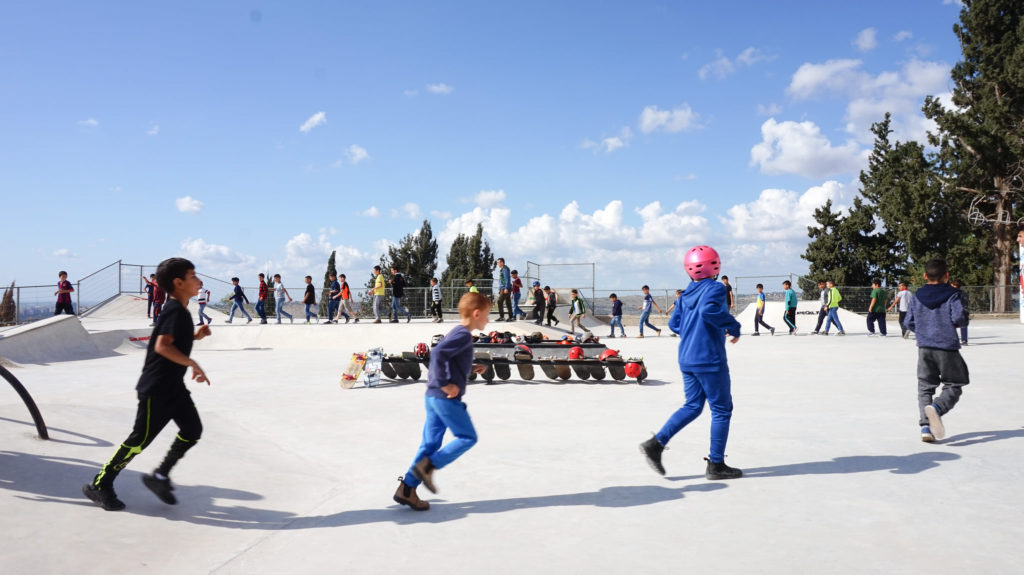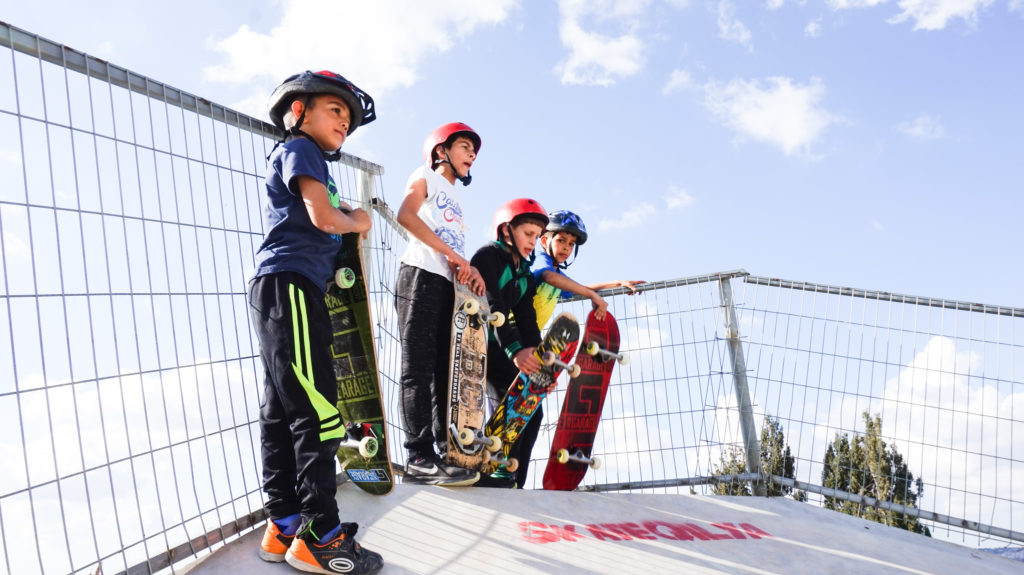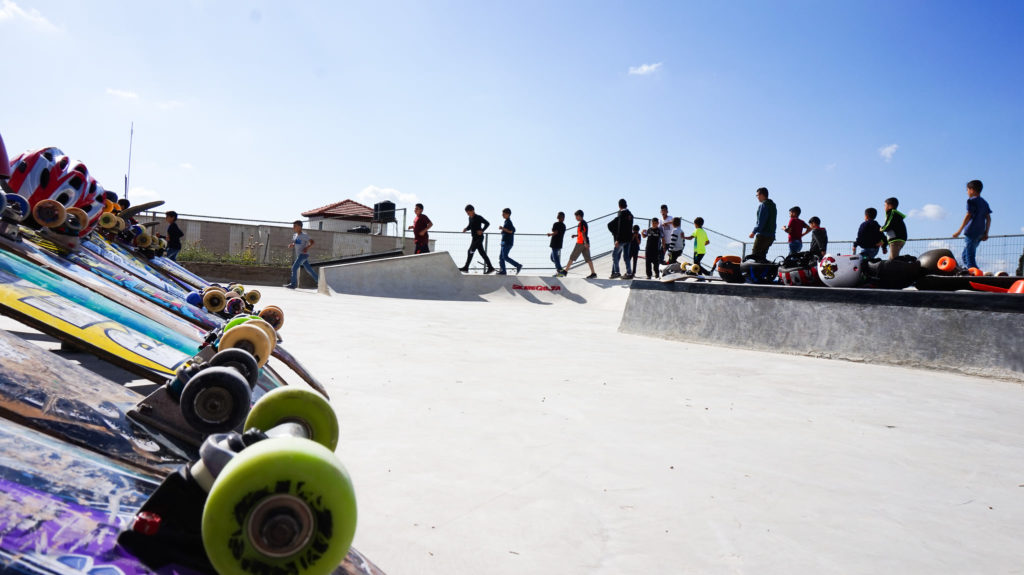Palestinian Skateboard Culture: Though Palestinians living in Gaza and the West Bank face restrictions on freedoms and movement that many of us would find unfathomable and insufferable, many young Palestinians are just seeking to claim their identity and expression through many of those creative avenues available to youth everywhere.
To this end, a thriving skateboarding culture has emerged in the occupied territories. In these locations and through these activities, young Palestinians can lose themselves for a time, leaving checkpoints, searches and untoward suspicions behind. This Skater culture is yet another reminder that Palestinian interests are not so different from those of others others around the globe. The kids just wanna have fun… and maybe stick a gnarly grind.
A Skatepark Comes to the West Bank.
In the past, skating culture has tried to take root in the West Bank, Palestine with the appearance of occasional homemade skateboarding props including funboxes and mini ramps. Many of these were built by foreign travelers and volunteers spending time in the territories and seeking to join locals for some serious shredding.
Then in 2014, in the northern city of Zababdeh, the West Bank’s first official skatepark opened, the product of an Edinburgh NGO called SkatePAL. Founder and avid skateboarder Charlie Davis had been coming to Palestine since 2006, and the idea of building a skatepark somewhere in the territories developed kind a kind of Quixotic pursuit. Taking inspiration from similar projects in India and Afghanistan, Davis formed SkatePAL in 2012, and began a campaign of raising funds and assemble volunteers. After an initial build of a few wooden ramps in Ramallah was destroyed, Davis sought input from engineering students at the University of Edinburgh to build a more permanent structure. Thus the Zababdeh project was born.
In 2015, the movie Epicly Palestine’d: the Birth of Skateboarding in the West Bank was released highlighting the story of the skatepark’s opening and Charlie’s commitment and vision. As skaters themselves, filmmakers Theo Krish and Phil Joa wanted to showcase the growing skate scene that caught them by surprise. In the film, they not only highlight the passion of Davis, they underscore the power of something communal like skate culture to empower even the most subjugated, giving them a bit of a break from the struggles of occupation.
A Skate Culture in Gaza Emerges.
In the last couple years in Gaza City, a few makeshift ramps and ledges popped up near the sea, developing into Gaza’s first and only active skatepark. Young men began gathering in this area not only to hone their skills (most of which they’d picked up from Youtube ), but also to get a break from a tense occupation that’s even more restrictive and claustrophobic in Gaza than in the West Bank.
Even getting skateboards to Gaza through the Israeli blockade was a challenge, leaving many of the enthusiasts to share their boards along with their encouragement. Friday afternoons became the busiest, as young skaters were now out of school or off of work. The skating began to provide a more constructive outlet then joining the weekly Hamas protests near the border with Israel. For those choosing to skate instead, that was precisely the point. As regular Ezzedine Mashharawi told France 24, “We get rid of all that negative energy through skateboarding.”
Hasan Between Two Worlds.
Three years ago, West Bank resident and skateboarding enthusiast Hasan left his hometown of Qalqilya in the Western part of the territory to enter Israel on a daily visitor’s permit. He didn’t return. Instead, he assumed any number of ‘under-the-table’ jobs in landscaping and restaurant work in Haifa, a town in Israel.
Though there illegally, Hasan welcomed this inclusion. Qalqilya is, in fact, a conservative culture that didn’t initially accept young Palestianians like Hasan forming their identity through such counterculture. For Hasan, it was more true to himself to explore such an alternative approach in the cosmopolitan Haifa, even if that meant risking being sent off to prison.
The relocation didn’t mean that Hasan forgot about Qalqilya, however. In his absence – and to some degree inspired by him and other Qalqilya skate sojourners – a group called Skateqilya has since opened in Hasan’s hometown to offer a skate camp and instruction to Qalqilya youngsters.
And Hasan has noticed. Tiring of living illegally in Israel, Hasan intends to make his way back to Qalqilya and lend his help to Skateqilya, hopefully assisting in the growing acceptance of this alternative culture back home. Also he hopes to make a film on skating life in the West Bank in an effort to get a film scholarship in the USA. While Haifa provided some much needed community and inspiration, the time has come for Hasan to make his mark on his own.
Final remarks
In many ways, the rebellion and expression represented in skateboarding life and culture is even more needed in places like Gaza and the West Bank. It can be argued that these young participants are the true believers – examples of how such expression can be not only a break from the tensions of occupation, but a form of identity and resistance itself. The skateboarding scene in Palestine is only growing, and so is the international audience to bring the due respect.
Find us online
Whatsapp:+972599479880
For more information, please visit our website: https://excellencenter.org
Excellence Center’s Facebook page: https://www.facebook.com/ExcellenceCenter
Excellence Center’s Facebook account: https://www.facebook.com/RafatECHebron
Watch us on Youtube: https://www.youtube.com/channel/UCsQSLdFZWZcBm6Uj0XMYuKg
Visit and Explore Palestine: https://www.facebook.com/ExplorePalestine






